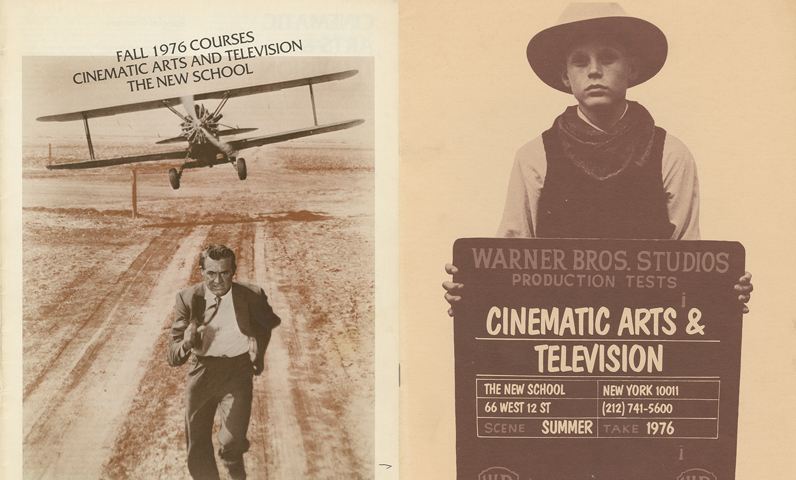
The Medium Is The Message: Media Studies Celebrates 40 Years
When porta-paks, the first consumer video recorders, first hit the market in the 1970’s, they were immediately put into the hands of students in The New School’s Media Studies program.
Armed with this cutting-edge technology, students took to the streets of New York City to document everything from the HIV/AIDS crisis to the struggle for racial equality.
“It was a time when activist organizations, especially in New York City, were realizing the importance of mustering the media for social good,” says Anne Balsamo, dean of the School of Media Studies at The New School. “The New School was at the forefront of this movement, serving as a home for activist media makers and incorporating socially engaged filmmaking into its curriculum. That focus, and the use of the latest technology, remains distinctive features of the program to this day.”
Indeed, ever since its founding by John Culkin in 1975, the study of the social impact of mass communication has been the driving force of the School of Media Studies. That, combined with its relentless relevance amid an ever-evolving media landscape, makes the School of Media Studies one the most illustrious educational institution of its kind.
This academic year, Media Studies will take a look back—this time, at its own evolution—when the school commemorates its four-decade anniversary with Forty Years Looking Forward. The series of events kicks off with a keynote address on Friday, Sept. 25, in the Auditorium at 66 West 12th Street.
The School of Media Studies’ history goes back to 1975, when the university began offering a Master of Arts degree in Media Studies—one of the first graduate programs of its kind in the United States.
“Other universities had established programs in film production or communication studies, but few, if any, included a focus on media theory,” Balsamo says. “The program in Media Studies, on the other hand, looked at a range of media production practices—radio, television, film, music, advertising—to create a foundation for understanding the cultural impact of media. It was one of the first programs that explicitly blended theory and practice.”
The program’s forward-thinking pedagogy has always been complemented by its enthusiastic embrace of new technologies and platforms. When Media Studies first launched, it was one of the only programs of its kind that emphasized sound studies (“an incredibly important tool to convey messages,” Balsamo says). In the 1970’s, the program introduced Super 8 cameras and portable video into the classroom to teach independent filmmaking. A decade later, students were handed consumer-grade camcorders, a powerful tool in the production of activist documentaries. In the late 1980s, the school began offering “connected” classes that used dial-up modems and a computer interface.
“We’ve set up a framework in which we’re continuously adapting to changes,” Balsamo says. “Being rooted in Culkin’s tradition, we’re always responding to the new, while at the same time studying how the new is informed by the old.”
In the 2000s, Media Studies, staying ahead of the curve, expanded its offerings in media management. At the time, Silicon Valley was beginning to pick up steam, and a crop of new media companies rooted in “networked culture,” as Balsamo put it, were just getting off the ground.
“The faculty understood the media industry was changing dramatically; it would need an expanded range of media professionals, not just media producers, but also media managers who would be responsible for overseeing new sorts of media productions built on emerging technologies,” Balsamo says. “We weren’t necessarily training our students to go to NBC to run television or to Hearst to run newspapers; we were training them to go to IBM to manage websites and Apple to manage application development.”
In the following decade, Media Studies embraced the explosion of social media platforms, leveraging this transformational—and interactive—technology to advance The New School’s mission of confronting pressing social issues. The Documentary Studies certificate program was launched, drawing students from around the world to learn the theory and practice of documentary filmmaking.
Looking back on the history of Media Studies—and the history of media itself—one can’t help but be astounded by the rapid pace of change. How has Media Studies been able to keep up? Balsamo credits the faculty, “who are uniquely engaged with the students, their experiences, and the role of media in people’s lives.”
“Our faculty members have always included practicing media professionals—filmmakers, curators, designers—who are engaged in contemporary media production,” she adds. “And we have also always had media theorists and scholars who study the philosophical and sociological dimensions of media.”
Balsamo also praised The New School’s students, who have been just as much involved in shaping the Media Studies curriculum as their instructors. Media Studies has always been about collaboration, the exchange of ideas, and a keen awareness of what has been and what could be.
“Throughout the history of Media Studies, there has always been an appeal to the brilliance of students who are here and those who are yet to come, who join our program with fascinations and interests,” Balsamo says. “Our job as educators, teachers, and mentors is to enable them to broaden these interests, gain expertise, and not just respond to the future, but to shape it.”
For more information, visit www.newschool.edu/public-engagement/school-of-media-studies.